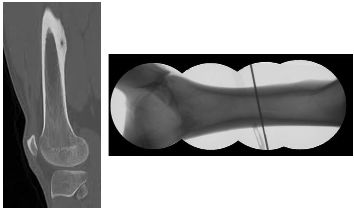Diplomarbeit / Masterarbeit / Bachelor thesis (DA/MA/BA): 2D/3D Registration of CT to an X-ray Mosaic
[Subtitle]Thesis by:
Advisor: Professor Nassir Navab
Supervision by: Lejing Wang and Pascal Fallavollita
Due date:
Abstract
During long bone fracture reduction surgery, one X-ray image mosaic is created by stitching several individual fluoroscopy images in order to show the entire bone structure of interest to the surgeons. Preoperative assessment and decision making is usually based on standard 2D X-rays of the injured limb using a planning software. The system allows lines to be drawn by the surgeon and merged directly on the X-ray. While navigating the reduction of the fracture intraoperatively, these lines provide graphic and numerical descriptions of the reduction. Surprisingly, 3D information from computed tomography (CT) is not used intraoperatively in order to help guide surgery. The aim of this project is to develop a new clinical protocol involving the 2D/3D registration of preoperative CT data to the individual X-ray images and the final X-ray mosaic. We hypothesize that the creation of multiple DRRs from CT fused together with the X-rays will help guide proper positioning and alignment of the patient’s injured bone. As an additional constraint to correct re-alignment of bone, we also incorporate the pre-planning lines drawn by the clinicians prior to intervention. (requirement: C++ knowledge).
Requirements
- C++ in MS Visual Studio. (Matlab is recommendable )
- Interest in medical technology (You will work most of the time at Narvis).
- Basic knowledge of 3D transformation is recommendable .
What do we offer
- Experience with different fields of research in computer science: Computer Vision, Visualization, Software Engineering.
- Knowledge about clinical/surgical workflow, medical technology (watching a real computer aided medical operation is possible).
- Your thesis and degree. (and also an academic paper, which depends on your performance)
- Working within the real project on the cutting edge technology. The CamC system is introduced into the real patient study, and the outcomes of your research will be used in the near future.
- Coffee machine, Narvis lab working space in the city center.
Contact
If you are interested please contact Lejing Wang or Pascal Fallavollita| ProjectForm | |
|---|---|
| Title: | 2D/3D Registration of CT to an X-ray Mosaic |
| Abstract: | During long bone fracture reduction surgery, one X-ray image mosaic is created by stitching several individual fluoroscopy images in order to show the entire bone structure of interest to the surgeons. Preoperative assessment and decision making is usually based on standard 2D X-rays of the injured limb using a planning software. The system allows lines to be drawn by the surgeon and merged directly on the X-ray. While navigating the reduction of the fracture intraoperatively, these lines provide graphic and numerical descriptions of the reduction. Surprisingly, 3D information from computed tomography (CT) is not used intraoperatively in order to help guide surgery. The aim of this project is to develop a new clinical protocol involving the 2D/3D registration of preoperative CT data to the individual X-ray images and the final X-ray mosaic. We hypothesize that the creation of multiple DRRs from CT fused together with the X-rays will help guide proper positioning and alignment of the patient’s injured bone. As an additional constraint to correct re-alignment of bone, we also incorporate the pre-planning lines drawn by the clinicians prior to intervention. (requirement: C++ knowledge). |
| Student: | |
| Director: | Prof. Dr. Nassir Navab |
| Supervisor: | Lejing Wang, Dr. Pascal Fallavollita |
| Type: | DA/MA/BA |
| Area: | Registration / Visualization, Medical Imaging, Computer-Aided Surgery, Medical Augmented Reality |
| Status: | draft |
| Start: | |
| Finish: | |
| Thesis (optional): | |
| Picture: | |